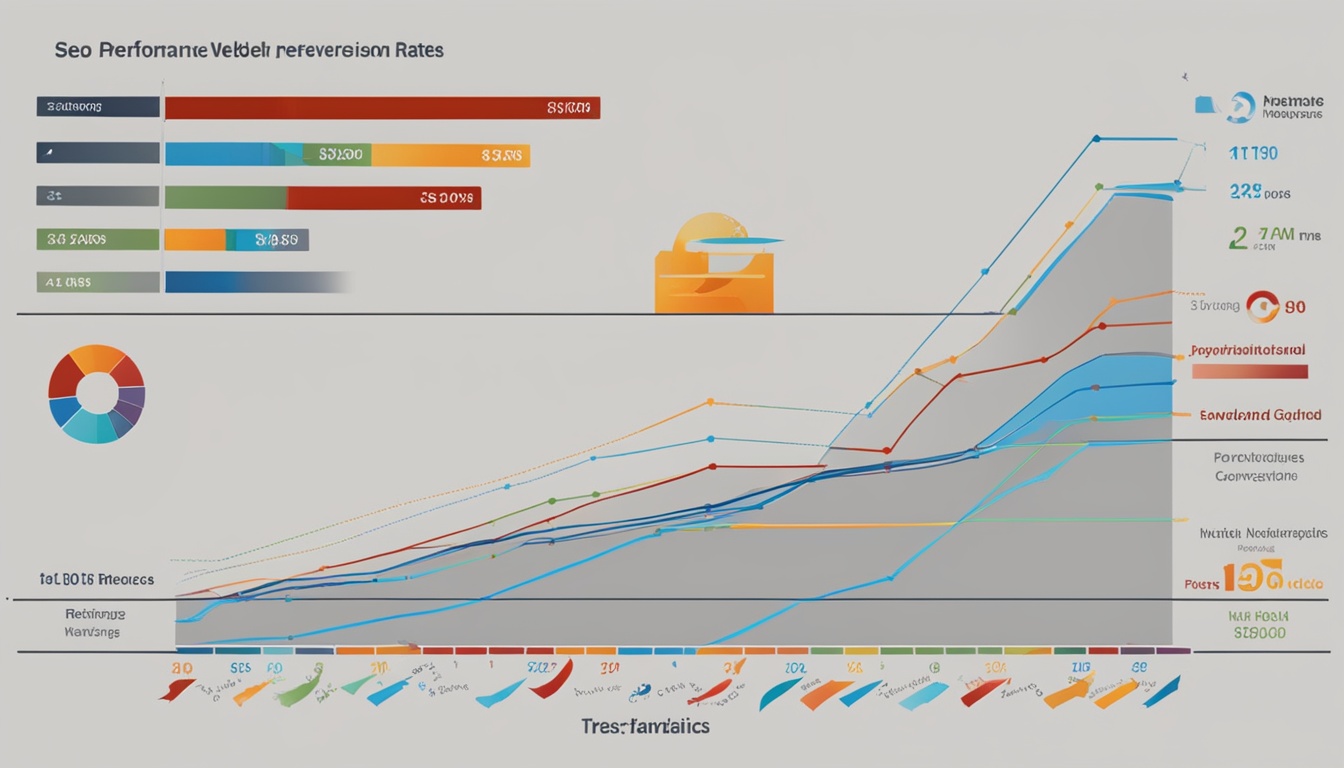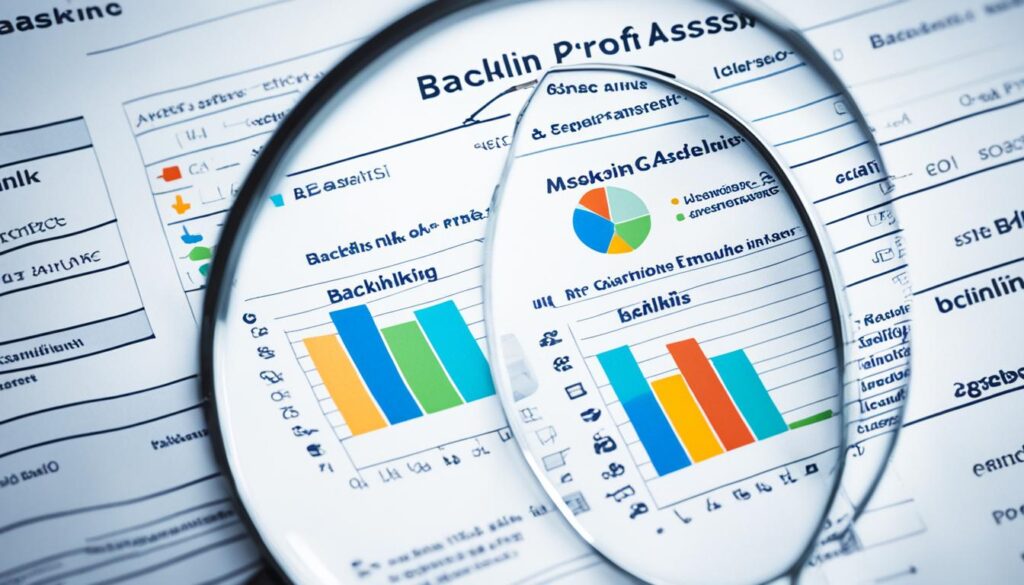
In this section, we're diving into essential performance metrics for your site's success. Knowing SEO metrics well is key to making your site more attractive and bringing in more visitors. These metrics offer insights into how your site performs and how users interact with it.
Performance metrics look at many areas on your site, like how well keywords do, where your site's traffic comes from, and the quality of your backlinks. They also check your page speed, how much people interact with your content, how friendly your site is for mobile users, and other details. It's all about making your site work better for both people and search engines.
When you keep an eye on these numbers, you can find places to improve. This can help your site rank better in search results. Each metric plays a part in your site's success. So, let's break down each one and see how they can make your site stand out:
Key Takeaways:
- Understanding SEO performance metrics is essential for optimizing your website and attracting more visitors.
- By analyzing keyword performance, website traffic, and backlink profile, you can make data-driven decisions and improve your SEO strategy.
- Monitoring page load speed, content engagement, and mobile friendliness helps enhance user experience and increase conversions.
- Local SEO metrics and competitor analysis enable you to target specific geographical areas and stay ahead of the competition.
- Regularly tracking and optimizing your website's performance metrics is key to staying ahead in the ever-evolving landscape of digital marketing.
Keyword Performance Analysis
Understanding how keywords perform is key to good SEO. By looking closely at which words and phrases work best, you can fine-tune your website. This helps bring in more visitors and boost how you show up in search results.
The Importance of Keyword Research
Picking the right keywords starts with knowing what people are searching for. This means getting into your audience's head to see what they need. When you know this, you can put together content that really speaks to them.
Tools like Google Keyword Planner and SEMrush are great for this. They give you info on how often keywords are searched, their competition, and more. This data helps you choose the best keywords to focus on.
Tracking Keyword Rankings
After choosing your keywords, it's vital to keep an eye on how they're doing. This tracking helps you see if your SEO work is paying off. It also shows if you need to make any changes.
Looking at rankings shows you which keywords are really working for you. You can then put more effort into these. This helps make your content more appealing and useful to those searching online.
Optimizing for Improved SEO Rankings
Studying keyword performance helps you know where to improve. If certain keywords are doing well, you can focus on them more. This drives up your site's visibility in search engines.
Improving your SEO involves adding keywords to your content and making your site more user-friendly. It also means linking to other relevant sites. All these things together make your site more likely to show up in top search results.
SEO work is never done. It's key to always keep an eye on how your keywords are doing. With this data, you can keep making your site better. This ongoing work helps you stay ahead in search results.
Website Traffic Analysis
It's key to know how well your website is doing. Website traffic is essential for your online success. Google Analytics is a valuable tool. It helps you see how many people visit, what they look at, and more.
Google Analytics gives you a full look at your site's performance. You can track how well your strategies are doing and fix areas that need work. Knowing how people use your site helps you make it better for them.
One important thing to watch is the bounce rate. It shows how many leave after only seeing one page. A high bounce rate might mean they didn't find what they wanted. Or, your site's layout might be hard to use. Google Analytics helps you find and fix these problems.
It also shows where your visitors come from. This could be from searches, social media, or other sites linking to yours. Knowing this helps you focus your marketing where it works best. For example, if social media brings a lot of people, you can better your content there to draw even more.
Google Analytics tells you a lot about how people use your site. It shows what pages they like, how long they stay, and where they go next. This lets you understand what content works. You can then make choices that bring in more visitors and turn them into users.

Keeping an eye on your site's performance with Google Analytics is smart. By making your site better, the experience more pleasant, and focusing on what drives traffic, you can achieve more online. Google Analytics shows you how and where to improve.
Website Traffic Analysis Checklist:
- Utilize Google Analytics to track website traffic
- Analyze the number of visitors and page views
- Monitor the bounce rate to identify potential issues
- Identify the sources of traffic to focus your marketing efforts
- Analyze user behavior data to optimize content and improve engagement
| Metrics | Key Insights |
|---|---|
| Number of Visitors | Measure the overall reach and popularity of your website |
| Page Views | Analyze which pages are attracting the most traffic |
| Bounce Rate | Identify potential issues with user engagement and website navigation |
| Source of Traffic | Focus your marketing efforts on the channels that drive the most traffic |
| User Behavior | Analyze how users navigate through your website and optimize accordingly |
Backlink Profile Assessment
Backlinks are key in SEO, acting like "votes" from other sites. They tell search engines your content is good. But, not all backlinks are the same. It's crucial to watch over your backlink profile. This means keeping track of how many and what kind of backlinks link to your site.
It's vital that your backlinks are from trusted places. Links from important websites help your site's ranking on search engines. This is because they are seen as more reliable.
Tools like Ahrefs and Moz can show you your backlink profile. They help you see the quality and number of backlinks you have. They also help you look for chances to get good backlinks.
These tools can help you:
- Keep track of how many backlinks you have.
- Check how good the websites linking to you are.
- Look at the words used when linking to you.
- Find and deal with bad backlinks that might hurt your site.
Working on your backlink profile can make your site rank better in search results. But remember, it's not just about getting a lot of backlinks. The quality and how relevant they are matter too.
"A strong backlink profile is like having a network of reputable references vouching for your website's credibility and expertise." – John Smith, SEO Expert
Benefits of a Strong Backlink Profile
A good backlink profile has many advantages for your site:
- Higher rankings in search engines: Good backlinks can make your website show up more in search results, helping more people see your content.
- More people reaching your site naturally: Ranking better in search means more people find your site while looking for information or products.
- Boosted site reputation: Links from trusted places show your site is reliable, which is good for your online image.
- Improving user experience: Links from relevant sites can lead your visitors to important content, making their visit to your site more helpful and enjoyable.
A Case Study: The Impact of Backlink Quality on SEO
In a study by SEO professionals, sites with high-quality backlinks did better than those with poor backlinks in search traffic and rankings.
| Website A (Low-Quality Backlink Profile) | Website B (High-Quality Backlink Profile) | |
|---|---|---|
| Organic Search Traffic | 1,500 visitors/month | 5,000 visitors/month |
| Search Engine Ranking | Page 2 | Page 1 |
This study highlights the value of quality backlinks for better SEO and more search traffic. By aiming for backlinks from credible sources, you can boost your site's visibility and success in search engine results.

Conclusion
Wrapping up our talk on SEO analytics, it's obvious Google Analytics is crucial. It helps you clearly see and improve how your website is doing. By keeping tabs on important details like how well your keywords work and who visits your site, you can smartly boost your ranking in searches.
It's key to check on these details often and use the best tools. Doing this helps you lead in the changing digital world. With Google Analytics guiding you, you can tweak your SEO plan wisely. This brings more of the right people to your site. So, dive into this powerful tool, learn from it, and watch your site do better than ever.
Success online isn't about guessing but using data to plan your moves. Google Analytics is your go-to, offering insights that can refine your SEO work. It pinpoints what's strong and what needs work on your site. So, use analytics, improve your strategy, and see your site shine in the online scene.
FAQ
What are SEO performance metrics?
SEO performance metrics are important numbers. They show how well your website does on search engines. These numbers let you see what works and what doesn't on your site. You can then use this info to get more people to visit.
How do I analyze keyword performance?
To understand how keywords perform, do research and keep an eye on them. Look at where keywords rank in searches to find the best ones. Google Keyword Planner and SEMrush are great tools for this. They help you figure out what keywords to use to get a higher search rank.
Why is website traffic analysis important?
It’s key to know how your site's traffic is doing. Google Analytics lets you watch visitors, views, bounce rate, and where your traffic comes from. This data shows what you need to work on. It helps you engage more with users and pull in more visitors. This can lead to more sales or interactions on your site.
How do I assess my backlink profile?
Looking into your backlinks means checking their number, quality, and sources. Ahrefs and Moz are good for this. They help you find ways to get better backlinks. Doing this can boost your website's spot on search engine pages.
How can I optimize my SEO strategy?
For a stronger SEO plan, keep an eye on key metrics often. This includes checking keywords, website traffic, and backlinks. Using the data, adjust your strategy to do better in the digital marketing game.











